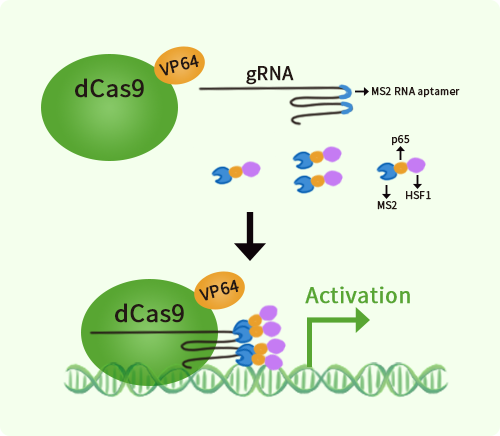Human Y14 (RBM8A) activation kit by CRISPRa
CAT#: GA106722
RBM8A CRISPRa kit - CRISPR gene activation of human RNA binding motif protein 8A
CNY 12,255.00
CNY 1,999.00
CNY 2,700.00
CNY 2,400.00
CNY 3,705.00
CNY 800.00
Specifications
| Product Data | |
| Format | 3 gRNAs (5ug each), 1 scramble ctrl (10ug) and 1 enhancer vector (10ug) |
| Symbol | RBM8A |
| Locus ID | 9939 |
| Kit Components | GA106722G1, Y14 gRNA vector 1 in pCas-Guide-GFP-CRISPRa GA106722G2, Y14 gRNA vector 2 in pCas-Guide-GFP-CRISPRa GA106722G3, Y14 gRNA vector 3 in pCas-Guide-GFP-CRISPRa 1 CRISPRa-Enhancer vector, SKU GE100056 1 CRISPRa scramble vector, SKU GE100077 |
| Disclaimer | These products are manufactured and supplied by OriGene under license from ERS. The kit is designed based on the best knowledge of CRISPRa SAM technology. The efficiency of the activation can be affected by many factors, including nucleosome occupancy status, chromatin structure and the gene expression level of the target, etc. |
| Reference Data | |
| RefSeq | NM_005105 |
| Synonyms | BOV-1A; BOV-1B; BOV-1C; C1DELq21.1; DEL1q21.1; MDS014; RBM8; RBM8B; TAR; Y14; ZNRP; ZRNP1 |
| Summary | This gene encodes a protein with a conserved RNA-binding motif. The protein is found predominantly in the nucleus, although it is also present in the cytoplasm. It is preferentially associated with mRNAs produced by splicing, including both nuclear mRNAs and newly exported cytoplasmic mRNAs. It is thought that the protein remains associated with spliced mRNAs as a tag to indicate where introns had been present, thus coupling pre- and post-mRNA splicing events. Previously, it was thought that two genes encode this protein, RBM8A and RBM8B; it is now thought that the RBM8B locus is a pseudogene. There are two alternate translation start codons with this gene, which result in two forms of the protein. An allele mutation and a low-frequency noncoding single-nucleotide polymorphism (SNP) in this gene cause thrombocytopenia-absent radius (TAR) syndrome. [provided by RefSeq, Jul 2013] |
Documents
Resources
| 基因表达相关资源 |
Other Versions
| SKU | Description | Size | Price |
|---|---|---|---|
| KN409770 | RBM8A - KN2.0, Human gene knockout kit via CRISPR, non-homology mediated. |
CNY 8,680.00 |


 United States
United States
 Germany
Germany
 Japan
Japan
 United Kingdom
United Kingdom
 China
China

